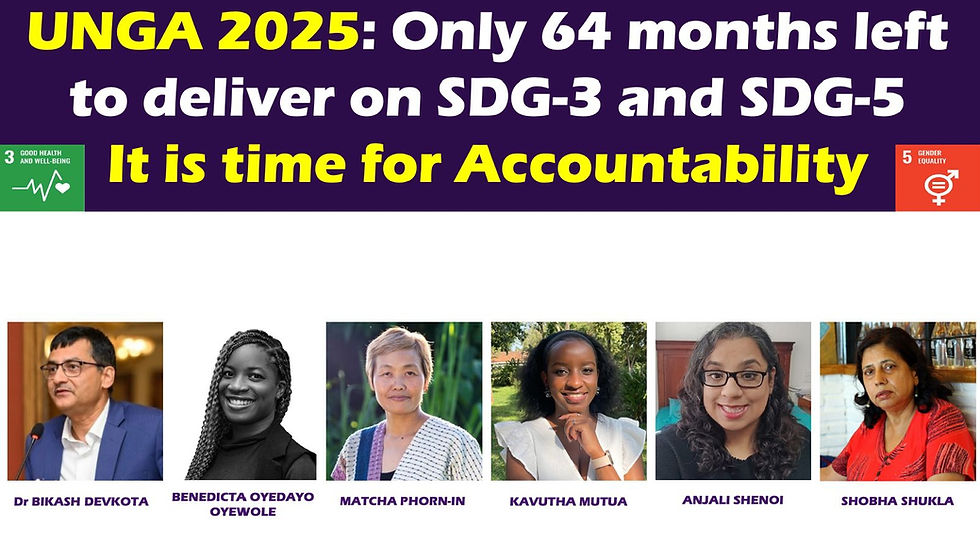Malaria Outbreak in Zimbabwe: A Growing Health Concern
- 365healthdiaries
- May 9
- 3 min read
By Hamu Madzedze
Online Health Editor-Zimbabwe
The Zimbabwe Ministry of Health and Child Care is deeply concerned about the sharp increase in malaria cases and deaths across the country in 2025.
Between Week 1 and Week 17, cumulative malaria cases have surged by 180%, rising from 21,309 in 2024 to 59,647 in 2025.
Malaria-related deaths have also increased by 218%, from 45 in 2024 to 143 in 2025.
This alarming trend is attributed to a combination of environmental and behavioral factors. Increased rainfall, humidity, and temperatures have created favorable conditions for mosquito breeding.
At the same time, more people are engaging in outdoor activities such as artisanal mining, farming, tobacco curing, and cross-border trading, particularly during dusk to dawn when mosquitoes are most active.
Many of these activities take place in remote areas where access to health services is limited, leading to delays in treatment and an increase in fatalities.
The number of reported malaria outbreaks has jumped dramatically from just one in 2024 to 115 in 2025, with only 23 brought under control. The majority of outbreaks have been reported in provinces with high levels of artisanal mining and agricultural activities. Mashonaland Central, Manicaland, and Mashonaland West are the most affected provinces, contributing a combined 82.8% of all cases and 72.9% of all deaths. Children under the age of five account for 14% of the total malaria cases.
In response to the outbreak, the Ministry of Health and Child Care has taken several steps.
These include the free provision of malaria prevention tools such as Insecticide Treated Nets (ITNs), larvicides, diagnostic kits, and treatment medicines.
Provincial and district health teams have intensified community mobilization and awareness campaigns to encourage early treatment and the use of mosquito prevention methods.
A total of 1,615,000 ITNs are being distributed in 14 high-risk districts, although there is a shortfall of 600,000 nets due to the withdrawal of funding from the United States Government.

The government remains committed to closing this gap through increased domestic financing.
Larvicides are being applied to breeding sites where available, although supply remains limited.
The country currently has adequate stocks of malaria medicines and diagnostic kits, which were prepositioned ahead of the peak transmission period through NatPharm in collaboration with Provincial Medical Directors.
All suspected malaria cases are tested and, if positive, treated appropriately.
Efforts are also ongoing to work with the Ministry of Mines and Mining Development to better reach artisanal mining populations, who are highly mobile and often difficult to access.
Despite these efforts, challenges remain. Climate change continues to expand the mosquito breeding season and increase the vector population.
Artisanal mining activities are increasing, and with them, the number of breeding sites and the population exposed during peak mosquito biting hours.
Many of these communities remain difficult to reach and are hesitant to engage with health authorities.
The Ministry reminds the public that this is the high malaria transmission period and urges anyone experiencing malaria symptoms such as fever, chills, sweating, headaches, joint pain, nausea, vomiting, or diarrhea to seek testing and treatment within 24 hours from their nearest health facility or Village Health Worker.
To prevent malaria, individuals can take several steps which includes sleeping in a sprayed house in districts that receive Indoor Residual Spraying, sleep under an Insecticide Treated Net (ITN) every day regardless of season in districts that received ITNs, wear clothes that cover most of the body when outdoors between sunset and sunrise and use mosquito repellents, and seek treatment promptly at the onset of symptoms.
Malaria is preventable and curable, but it can kill if not treated early.
*#MalariaEndsWithUs #ZimbabweHealth #MalariaPrevention #HealthForAll



Comments